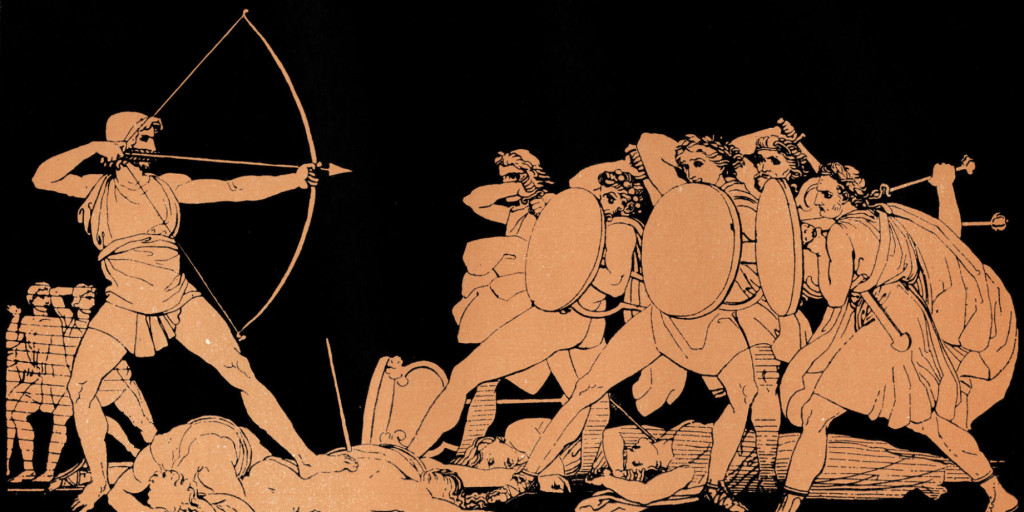The answer to the title question is in the Iliad:
‘The gods did this and spun the destruction of people
For the sake of the singing of men hereafter.’
Read on for an explanation.
I saw this title on an Amazon recommendation and bought it. My reaction is mixed. I learned something from it, to be sure, and I was reminded of other matters I had forgotten and that is all too the good. I will review some of that before turning to the vinegar in the mix.

The chapters on dating Homer and the Iliad reviewed the debates and evidence I had heard before as an undergraduate but also added a lot to it. Of course there are two issues in dating, one is the composition and the other is the event described in the Iliad. What was new to me here was both ancient and modern. The ancient part were excerpts from other ancient sources who commented on these two dates. The modern was the archeological finds that had not been ratified when I read the Iliad in college, one of which puts Homer himself a thousand years earlier than the received opinion of the 1960s! That reopens the question of the date of war he reported. Was it contemporary or many hundreds of years earlier still?
Then there is the recurrent question of Homer himself. Was he one person at a point in time, or was he several, each commenting on that big Asian land war, or several over time. Or was he the personification of a tradition of epic tales about a single war (or several wars, or a fictional war) in the way a Pop Music could be personified from fragmentary evidence so that a future archeologist might ask where Mr. Pop Music was born, how he managed to be so prolific….
The questions of dating and identity explain the differences between the Iliad with its rigourous hexameters and the varied measures in the Oyssesy, the obvious errors, the gaps, and the repetitions. One sample suffices, in the Iliad a named warrior is killed, his death detailed. Then a few score lines later he is back in battle! Homer nods, was the tag line.
The author does answer the title question although I am not sure he realises it when he quotes the lines above from the Iliad:
‘The gods did this and spun the destruction of people
For the sake of the singing of men hereafter.’
To explain, the gods led the men into this war to create events worthy of an epic poem of the magnitude and grandeur of the Iliad. Wars there were many, cattle raids, clan vendettas, boundary disputes over grazing land, pirate raids to rape and pillage in a day or two, involving this tribe, that village, a Kingdom here or there. But the scope of the Iliad adds all of those up and doubles it. Greeks from Ithaca on the Adriatic Sea to the Peloponnese, to Euboea in the Aegean Sea come together in a massive expedition. Jason had one ship and became legend. Here were a hundred ships to make an epic. None of these men would have been remembered but for the war, well, not quite, but for the poet who afterwards made the war and them memorable.

Art is life and the purpose of life is art. That is what we learn from Homer. Without art to capture, articulate, crystalize, preserve, and communicate life we are sheep in the field who leave nothing behind but dung and bones. When the flesh is gone, the poetry remains. That is Homer’s deepest meaning.
It is part of the genius of the Iliad is that it incorporates dissent, when the most enduringly famous warrior, the man at the centre of the Iliad, Achilles says he regrets it all. Famed as a warrior, slayer of men, many men, raper of women, many women, this same Achilles loved Briseis, loved Patroclus even more, weeps in the arms of Priam. This man of men is also a lover and loser. Fated, he knows. A preternatural warrior and an immature human being.
There were some omissions from the book, the foremost is some greater explanation of the origins of the texts we have. Does the Penguin Iliad trace back to…a complete Greek text on Egyptian papyrus? Is it the same original text that underlay Mathew Arnold’s Iliad two hundred years ago? When and how did Homer come to medieval Europe? Was he a travelling companion of Plato and Aristotle when Lorenzo Medici commissioned Latin translation from Greek masterworks then known in Europe only by references in extent Roman works. Plato and Aristotle we know did not exist in complete Greek texts but rather in Arabic translations that had survived and then a thousand years later were back translated into New Testament Greek. Without a doubt there were errors in translation. What was Homer’s path?
There is too much ME in the book. No doubt this personal element is an asset to some readers but not to this one. Knowing that the author thought of a passage from the Iliad when climbing the steps at…adds nothing and takes attention from the subject. There is a lot of this. Some has a thin justification in that he went to some of the places in Homer’s books, but even so, who cares these millennia later. He is no Homer. Moreover, he did not go to the obvious place, Troy and makes no comment on it. By the way, reopening the dates as mentioned above might mean Heinrich Schliemann was right about which layer at the site was the Homeric one!
I also found the comparisons to other Bronze Age people a long bow, and likewise the comparison of the Greeks at Troy to twentieth Century gang behaviour tenuous and tendentious. It filled the pages which I went over lightly, very without learning anything.
 Adam Nicolson
Adam Nicolson
Many of the Bronze Age comparisons do not apply to the cosmopolitan, urban, artistically rich Trojans, and Nicholoson says that and then ignores it at other times. He generalises about Homer as though the Trojans were not there. Yet one of the beauties of the Iliad is that the poet does not take sides. Priam is majestic; Hector is noble; Andromache is stoic. These are the losers, the Asians. In contrast Agammenon is grasping; Achilles petulant; and Odyseuss is lazy. These are the winning Greeks, and no PhD has ever disputed that Homer was Greek and on the Greek side in some sense.
Stylistic irritations include direct address ‘you’ which I find distracting, a faux familiarity, and informal where the rigour of formality is the best support for exposition. There also seem to be some liberties taken or are they simple prejudices as when he gratuitously refers to ‘the sterilities of Oakland California’ on p. 74. There a few of these, shall we say, Bill Brysonisms: snide and superfluous remarks.
There are extensive notes but I rather think they were selected for fit not after analysis. There follows a long bibliography. I thank the author for both since I suppose it took a fight with the publisher to include these extras. That said, I judge them to be window dressing, not substance.
Skip to content
